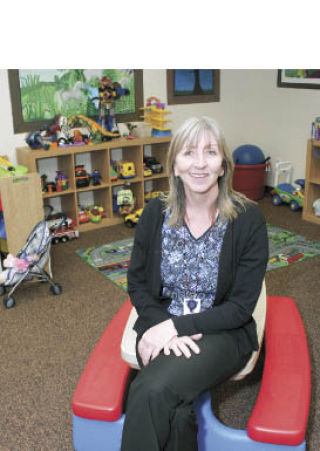Supervisor for center is right woman for job
Tracee Parker figured she would start a domestic violence safe center for children, not run it.
Parker took a job with the city of Kent four years ago to set up a safe center for children exposed to domestic violence to visit with their non-custodial parent. At the time, she had agreed to a one-year deal with the city.
Parker expected someone else would be hired to run the Safe Havens program after she spent nearly 18 months setting it up.
But after several interviews of potential candidates, Katherin Johnson, manager of the city human services department that oversees the program, encouraged Parker to take the job as the Safe Havens supervisor as well as the project coordinator.
“We were looking for someone to run the visitation center who understands the domestic violence focus, and that becomes difficult,” Johnson said. “Because Tracee had designed the center and written the policies, she basically knew it from the ground up.”
Parker discovered she made the right decision to run the program.
“It’s been more satisfying than I ever thought,” said Parker during a Wednesday interview at the Safe Havens center near City Hall in downtown Kent. “It feels like you’re part of a larger social justice with a lot of critical thinking.”
Safe Havens opened in January 2005 in Kent as one of four demonstration sites in the nation for a supervised visitation and exchange center. A grant from the U.S. Department of Justice funded the program for the first few years. Now funds from the state, King County and the city of Kent keep the program going.
Most families are referred to Safe Havens by judges after one partner receives a protection order against the other.
“Some victims ask for Safe Havens,” Parker said. “Others are not aware that the other parent is still allowed contact with the kids. The battered women cannot understand how their partner can still see the kids (through court-ordered supervised visitations).”
As part of her job duties, Parker conducts one-on-one interviews with a parent before that parent becomes part of the visitation program. She observes daily the interaction between children and the parent accused of domestic violence and learns a lot about how a parent will use children to try to get back in touch with their partner.
The parents with protection orders against them, mostly visiting fathers, show up at Safe Havens 30 minutes before their children are to arrive. The building has separate, secured entrances for each parent.
The mother brings the children to the center for the one-hour visit once per week. The mother can then leave, to return later, or can stay in a waiting area. When the visit ends, the father must wait 15 minutes after the children leave before he can leave.
Parker is the only full-time employee at the center. She also has three part-time employees and four relief workers to help cover the Wednesday through Sunday shifts. Fifty-five clients are currently set up for visitations.
Fees for the clients range from $2 to $50 depending on incomes.
“The visit has a supervisor in the room the whole time,” Parker said. “They can’t talk to the other parent or get any information. They can’t put the kid in the middle. That’s why we do an in-depth intake interview.”
With domestic violence involved in the relationships of the parents, Parker and her staff stay alert to any potential dangers.
“We always move as if somebody’s safety is at risk,” Parker said. “We assume risk and error on the side of caution. And we make sure the child is not used to find out information about the partner. We’re like detectives at times with the ways people try to get messages to their partner.”
Parents have tried to hide messages for their partner in gifts to the children. One father during a visit tried to teach his child a prayer to bring mommy to her senses and let him come back home, Parker said.
Although a few men have threatened Parker or her co-workers, for the most part the employees are not in danger.
“They’re not dangerous to us because we are not their target,” Parker said. “Most of them think they are innocent (of domestic violence) because she made (the incident) up.”
Outside of work, Parker, 47, who is single and lives in Seattle, spends a lot of time with her three adult children and a 16-month-old grandson.
“My grandson is my delight,” Parker said.
Parker, who has a master’s degree in conflict analysis from Nova Southeastern University in Florida and a bachelor’s degree in social sciences from Washington State, plans to pursue a doctorate in psychology. She also plans to take Spanish classes because so many Safe Havens clients speak Spanish.
In fact, the center hires interpreters who know 17 languages to handle the diverse population of South King County.
Parker said she always has had an interest in nonviolence advocacy. She speaks at national seminars to help combat domestic violence through what she has learned as the project coordinator for Safe Havens. Before coming to Kent, she worked several years for the Eastside Domestic Violence Program in Bellevue.
Johnson has watched Parker’s dedication to the job.
“She’s passionate about domestic violence issues and the safety of the women,” Johnson said. “She’s got the personality to work with both sides of it, the women and the men. And she knows the children’s issues. She understands the value of the program and (how) to deliver the highest quality of service possible.”
For more information on Safe Havens, go to www.ci.kent.wa.us/humanservices.
Talk to us
Please share your story tips by emailing editor@kentreporter.com.
To share your opinion for publication, submit a letter through our website https://www.kentreporter.com/submit-letter/. Include your name, address and daytime phone number. (We’ll only publish your name and hometown.) Please keep letters to 300 words or less.

